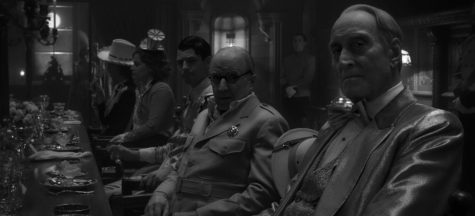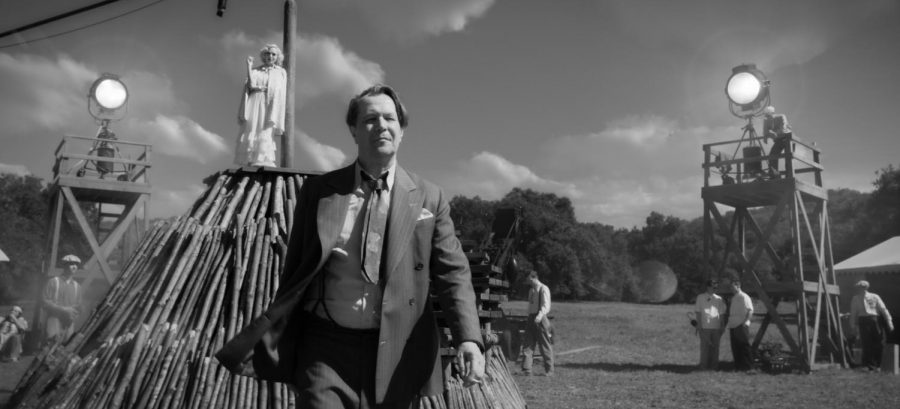REVIEW: ‘Mank’ is Fincher’s latest effort to sculpt Golden Age Hollywood
Coming off from developing Netflix originals “House of Cards,” “Love, Death, and Robots” and “Mindhunter,” filmmaker David Fincher returns to cinema with his latest Netflix Original, a feature film titled “Mank.”
The biographical drama chronicles the life of screenwriter Herman J. Mankiewicz (Gary Oldman) and his effort in writing Citizen Kane while clashing with Hollywood elites and alcoholism. Not only does “Mank” stand out as Fincher’s first feature film since “Gone Girl” in 2014, but it also seems that this may be a passion project for him. The film’s script was penned in the 1990s by Fincher’s father, Jack Fincher, who passed away in 2003 before the film could ever be made. When he originally tried to get the film made, Fincher had planned to cast Kevin Spacey and Jodie Foster in the lead roles.
Creating “Mank” may have been a personal mission for Fincher and while the idea of “Mank” being Fincher’s magnum opus is up for debate, there are so many elements at work that make it one of the strongest films of the year.
The film’s story provides layers of intrigue offered through witty dialogue, a structure that’s reminiscent of “Citizen Kane,” and a look into the political workings that affected early Hollywood. The debate about whether or not Mankiewicz truly did write the entire screenplay for “Citizen Kane” while Orson Welles swooped in to take the credit for it has lasted for decades. However, the film does not aim to take a side in this debate. It only provides a look into the events that took place and influenced the script.
Anyone who’s watched “Citizen Kane” knows the film carries strong political themes about the way media was manipulated at the time to push for certain agendas. Through “Mank,” we get an in-depth look at how media, especially film, was manipulated for the means of political propaganda.
Like “Citizen Kane,” “Mank” employs a nonlinear storyline approach with scenes that alternate between Mankiewicz’s time in the film industry during the 1930s and his process for writing “Citizen Kane” with help from his secretary (Lily Collins).

Fincher’s films have always been noted for their star-studded casts that show actors giving some of the most genuine-feeling performances possible, no matter how large or small the role may be. Oscar-winner Gary Oldman shines in his portrayal of the charismatic and self-destructive Mankiewicz, making the tragic screenwriter a compelling figure whose wit and outspokenness leads him walking into the right doors of the film industry, but also being walked out of the very same doors.
As a biopic set in the 1930s and 1940s, one can expect to see or hear some familiar names like Marion Davies (Amanda Seyfried), William Randolph Hearst (Charles Dance), Upton Sinclair (a cameo from Bill Nye) and of course, Orson Welles (Tom Burke). Seyfried plays Davies with a whimsical charm and individuality that immediately makes her the most interesting character whenever she’s on-screen, and her chemistry with Mankiewicz winds up producing some of the most memorable scenes of the film.  Similar to his role as Tywin Lannister in “Game of Thrones,” Charles Dance gives a memorable turn as Hearst, the renowned newspaper tycoon, providing just the right amount of menace underneath the veneer of affluence and glamour. In regard to Orson Welles’ portrayal, he isn’t very present throughout the film—though Tom Burke does well enough in a few minutes of screen time to capture the real-life Welles’ charisma and mannerisms.
Similar to his role as Tywin Lannister in “Game of Thrones,” Charles Dance gives a memorable turn as Hearst, the renowned newspaper tycoon, providing just the right amount of menace underneath the veneer of affluence and glamour. In regard to Orson Welles’ portrayal, he isn’t very present throughout the film—though Tom Burke does well enough in a few minutes of screen time to capture the real-life Welles’ charisma and mannerisms.  As Fincher proved with scarily accurate casting for serial killers in “Mindhunter,” he has an incredible eye for details and selection of performers. The ensemble cast of the film is large and full of noteworthy performances that portray the real-life figures with precision and immerse viewers into the early Hollywood setting.
As Fincher proved with scarily accurate casting for serial killers in “Mindhunter,” he has an incredible eye for details and selection of performers. The ensemble cast of the film is large and full of noteworthy performances that portray the real-life figures with precision and immerse viewers into the early Hollywood setting.
Undoubtedly, “Mank” is a masterwork in regards to technical qualities, such as its stunning black-and-white visual aesthetic, production design and musical score. Fincher previously dabbled in the black-and-white aesthetic when he directed the music video for Justin Timberlake’s “Suit & Tie” in 2013. In “Mank,” it’s used to full effect and immerses viewers into the Golden Age of Hollywood while calling back to films of the era.
“Mank” marks the feature film debut of cinematographer Erik Messerschmidt, who has spoken with Variety about the challenges of paying tribute to Greg Toland, cinematographer of “Citizen Kane” while trying to recreate the Golden Age feeling on a modern digital camera. The parallels between the cinematography of both “Mank” and “Citizen Kane” are quite notable, even if they seem a bit on-the-nose, especially the recreation of the “Rosebud” scene from the latter where the closeup of an empty alcohol bottle in Mankiewicz’s hand replaces Kane’s snow globe from the original film. Inevitably, viewers can come to expect such homages in a film that showcases the inspiration behind “Citizen Kane.”
Filmed in California, the film boasts incredible production design that recreates the offices of MGM, Hearst Castle, movie studios and dazzling ballrooms of the era. The most majestic set-piece that viewers see would have to be Hearst’s dining room, where shades of “Citizen Kane” become more visible and some of the most character-defining moments take place, particularly at the film’s climax.
Oscar-winning composers Trent Reznor and Atticus Ross take a step back from the foreboding sounds of electronic synthesizers to deliver another Oscar-worthy score that feels authentic to the film’s time period. The jazzy and upbeat score was entirely composed with instruments from the 1940s, further adding to the immersion that the film sets out to provide viewers with. Viewers can come to admire the dedication of the crew in recreating a 1940s California for viewers to explore on screen.
As the year draws to a close, “Mank” is a great film for Netflix subscribers to end the year on when new films have been so scarce as of late. The film offers a deconstruction of Golden Age Hollywood while serving as a strong entry for David Fincher to further demonstrate his directorial prowess for the new decade. After he’s signed a four-year deal with Netflix, fans can expect to see more projects from Fincher in the near future.












